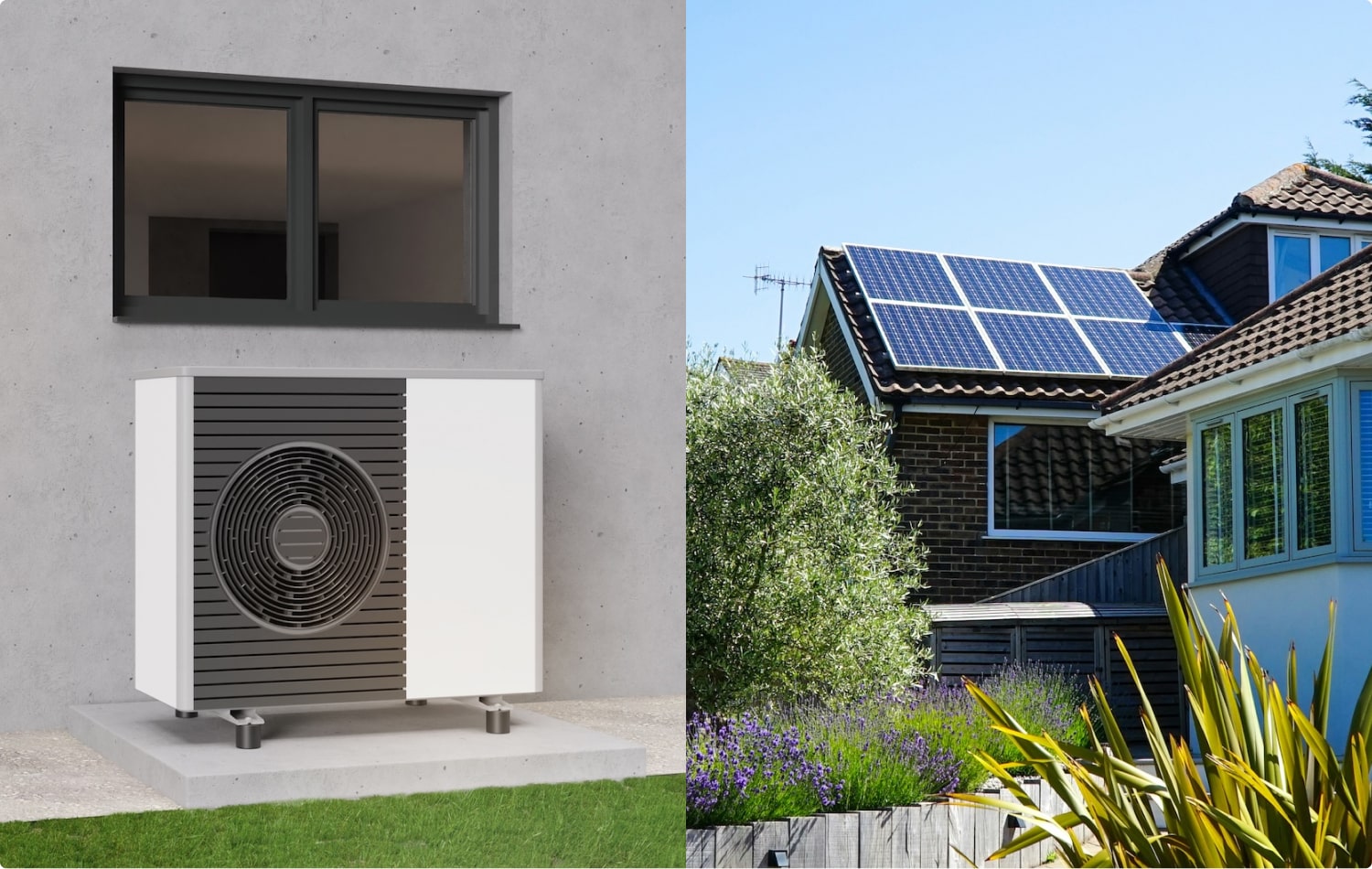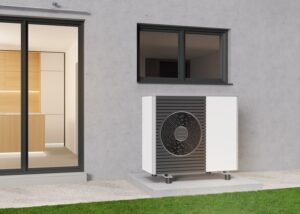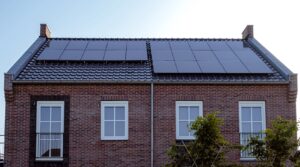
As more homes switch to low-carbon heating, a common question comes up: can you pair an air source heat pump with solar panels, and is it worth it?
In many cases, the answer is yes. The two systems can work together to cut running costs, reduce reliance on the grid, and make your home far more energy efficient.
At Bolton Electrical Services, we install solar panels for homes and businesses across Bolton and the North West, including systems designed to work alongside modern heat pumps.
Quick Summary:
You can combine the two. Solar panels can power a large chunk of your heat pump’s electricity use, especially in spring and summer.
Most UK homes need a 4–6kW solar system (around 10–16 panels) to noticeably reduce heat pump running costs.
Savings vary through the year: heat pumps work efficiently year-round, but solar generates less in winter, so your benefit is seasonal.
Upfront costs can be high, but long-term running costs drop significantly when the systems support each other.
How Air Source Heat Pumps and Solar Panels Work Together
How an Air Source Heat Pump Works
An air source heat pump takes heat from the outside air and uses it to warm your home and hot water. Even in cold weather, there’s still enough heat in the air for the system to extract and upgrade to a usable temperature.
Heat pumps are extremely efficient. For every 1kWh of electricity they use, they typically produce 3–4kWh of heat, which is why they’re becoming so popular in the UK. The better insulated the home, the better the performance.

How Solar Panels Generate Power
Solar panels create electricity from daylight using photovoltaic (PV) cells. That electricity can power anything in your home, including your heat pump.
When the heat pump is running during the day, your solar panels can directly offset a chunk of its electricity use, which means lower running costs.

The Combined System
When you pair a heat pump with solar panels, the two systems support each other. Solar panels generate clean electricity, and the heat pump uses that electricity to heat your home efficiently.
During sunny periods, your heat pump can run partly or entirely on free solar power. If you have a battery installed, any surplus solar energy can be stored and used later in the evening, when heat pumps often run more frequently.
This setup is one of the best ways to reduce overall heating costs and make your home far more energy independent.
Benefits of Combining Solar Panels and a Heat Pump
Lower Running Costs
When you pair a heat pump with solar panels, you immediately cut down the amount of electricity you need from the grid. Because heat pumps already run efficiently, supplying part of that energy with free solar power can make a noticeable difference to your bills.
Many homeowners see significant reductions in combined heating and electricity costs, especially if their heat pump runs during the day or they have battery storage to keep hold of excess solar energy. The more solar power you use, the more you save.
Reduce Carbon Emissions
Both technologies are low-carbon on their own, but together they make an even bigger impact. The heat pump uses far less electricity than a traditional boiler, and when that electricity comes from your own solar panels, the environmental benefits increase again.
If you’re aiming for a low-carbon home or planning ahead for future regulations, this combination is one of the strongest options available.
Energy Independence
With solar panels powering your heat pump and a battery to store any excess, you’re far less dependent on the National Grid. This brings more stability, predictable running costs, and peace of mind during times of high energy prices or grid interruptions.
Many households find they can run their heat pump partly on stored solar energy well into the evening, which makes the whole system feel much more self-sufficient.
How Many Solar Panels Do You Need to Power a Heat Pump?
Air source heat pumps are efficient, but they still need electricity to run. Most homes will see their heat pump use somewhere between 2,500 and 5,000 kWh per year, depending on property size, insulation, and how much heating or hot water you need.
To cover most of that electricity with solar power, many homes will need a 4–5kW solar panel system, which usually works out at around 8–12 panels. This won’t always run the heat pump entirely on its own, but it can offset a large part of the energy it uses and bring your running costs right down.
Key Factors Affecting Panel Count
The exact number of panels depends on a few important details:
- Your heating demand: Larger homes or properties with poor insulation will need more electricity, so more panels may be required.
- The heat pump itself: Modern high-efficiency models use less power, which reduces the number of panels needed.
- Your roof and location: A south-facing roof with little shading produces far more energy than an east- or west-facing roof. Sunlight levels also vary slightly across the UK.
Taking these into account helps us design a system that matches your heat pump’s energy use as closely as possible. Check our our guide to how many solar panels your property needs.
The Cost of Air Source Heat Pumps and Solar Panels in the UK
Typical Installation Costs
When you combine an air source heat pump with a solar panel system, the total cost will depend on property size, energy demand, and whether you choose extras such as battery storage.
There is financial support available in the UK that can help bring costs down:
- The Boiler Upgrade Scheme offers £7,500 off the cost of a heat pump installation.
- Solar panel systems qualify for 0 percent VAT, which helps reduce upfront costs for homeowners.
Overall, the combined system can be far more affordable than many people expect once incentives are factored in.
Return on Investment
Although the upfront cost is significant, the long-term savings can be substantial. Solar panels reduce the amount of electricity you buy from the grid, and the heat pump uses that cleaner, cheaper power to heat your home efficiently.
Most households see the system pay for itself in around eight to twelve years, depending on energy usage, roof suitability, and whether battery storage is included. With energy prices remaining unpredictable, creating your own renewable power offers stability and long-term value.
Is a Solar and Heat Pump Combination Right for You?
Ideal Property Types
A combined solar and heat pump setup works well for many UK homes, but there are a few things that make it an especially strong fit.
If your home is well insulated and has enough usable roof space for solar panels, you’re already in a good position. The heat pump will run more efficiently in a well-insulated property, and the solar panels will have enough room to generate the electricity needed to support it.
This kind of system is also a great choice for larger homes or properties in rural areas, where heating demand tends to be higher and energy costs can fluctuate more. In these cases, the savings and energy independence from pairing solar panels with a heat pump can be even more noticeable.
Professional Assessment
If you’re unsure whether your home is suitable, the best next step is a professional assessment. At BES, we carry out site surveys to check roof suitability, insulation levels, system size, and the likely performance.
We’ll give you advice on whether heat pump and solar is right for your home and the best system.
Heat Pumps and Solar Panels FAQs
Can solar panels power an air source heat pump?
Yes. Solar panels can supply some or all of the electricity your heat pump needs. How much they cover depends on the size of your solar system and when you use energy throughout the day.
How many solar panels do I need for a heat pump?
Most UK homes need around 8–12 panels (roughly a 4–5kW solar system). This offsets the typical electricity consumption of an air source heat pump. A professional assessment will give a more accurate figure.
Are heat pumps and solar panels worth it in the UK?
Yes. When combined, they can significantly lower energy bills, cut carbon emissions, and make your home more energy efficient. With incentives like the Boiler Upgrade Scheme and 0% VAT on solar, the savings are even better.
Can I use a battery with solar panels and a heat pump?
Absolutely. Batteries store excess solar energy and use it when the heat pump runs at night or on cloudy days. It’s one of the best ways to get the most out of a combined system.
What’s the lifespan of each system?
Solar panels typically last 25–30 years, while air source heat pumps last around 15–20 years with regular servicing.
Do I need planning permission?
Most installations do not require planning permission. Exceptions include listed buildings, flats, or properties in conservation areas, where extra checks may be needed.
